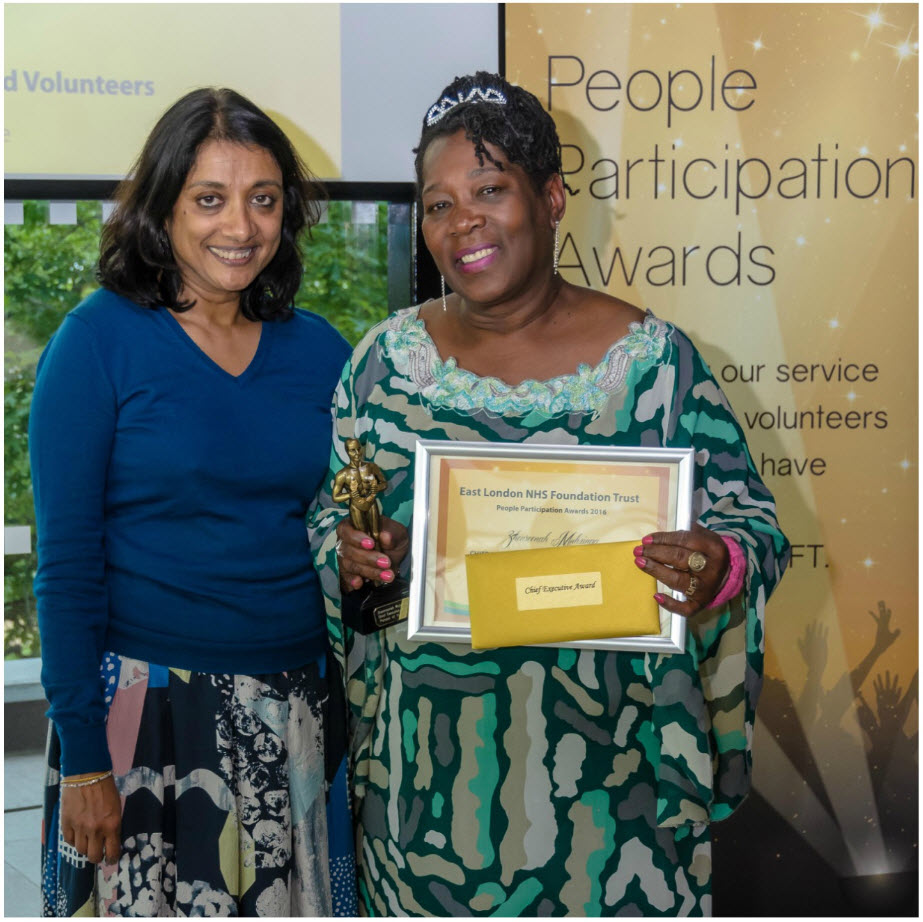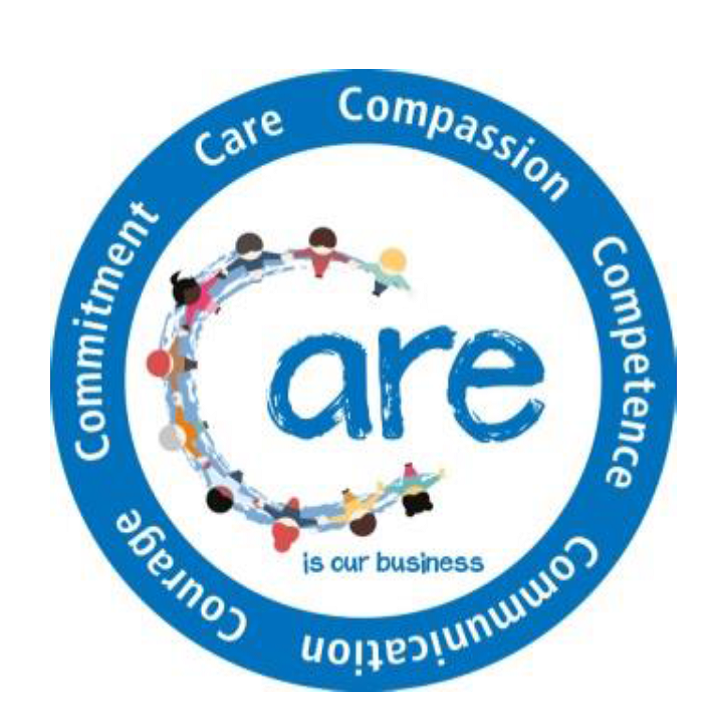
A Carers’ Perspective on Quality Improvement: A personal story
6th September 2017
Thana, QI Communications Assistant, interviewed Zhenreenah; a carer and expert by experience client in August 2017, about her abundant passion and energy for engaging with QI Projects at the Trust. She shared her expert advice in this personal story.

Zhenreenah
Carer | Expert by Experience
(Pictured with ELFT CEO Dr Navina Evans at the People Participation Awards)
Are you involved in any QI (Quality Improvement) projects currently? If yes, please could you share your story.
I am very passionate about Carers and based on my personal experience, I am committed to sharing my expertise to improving the service and Quality Improvement is the way forward.
One of the key issues for me was that Carers were not aware of what was happening in both the Trust and with Social Services in Newham. As carers we access services from both organisations. Services were in transitions and it was very challenging and we carers felt that there was a need to keep people/carers updated. There was a gap and we tried to address it.
One of the concerns was that previously integrated services were fragmented, as for example when social services were “disconnected” from East London Foundation Trust services (ELFT) without any communication with clients like us Carers. It was very confusing when it all suddenly disappeared including engagement with us carers’ group as we worked closely with both organisations.
Therefore, one of the early QI projects was the compilation of a carers’ pack which started as a mini project with a small group of passionate carers to address the confusion.
What was the project aiming to do?
Following suggestion from former ELFT staff, the need for a QI carer’s group was discussed and this led us to come together as carers to collect and share information about local services which we felt would be useful in our role caring for our families.
The key aim of the project was to collate the information about services which spanned various stakeholders so in essence we wanted to bridge the gaps in services so information was easily accessible.
We wanted to compile a reference document which clearly stated what carers were seeking and how best to access services. This led to the creation of the Carers’ Information Pack and quarterly Newsletters related to Mental Health in Newham.
What was your motivation to be part of the project?
I have a passion for carers. Many carers like myself are sometimes left in the dark and they need a voice to share their opinions. I now share my enthusiasm with others carers during the ELFT monthly induction sessions for new staff members joining the Trust.
This Carers’ Information Pack can provide information and help find carers who we don’t currently reach and also identify “hidden” carers who are not registered in the system as such. Many are just too busy caring, for their loved ones and have no clue that they’re Carers and in need of a statutory Carers assessment to acknowledge this.
It is estimated that there are currently approximately 24,000 carers. (Editor’s Note : This is not a definitive audited figure as we don’t have the authorised data) in the local community in Newham but we don’t have the number of carers who manage mental health within family members. I have tried many times to collect the information but have yet to succeed.
I am very grateful that previous ELFT staff member and Carers UK (an independent charity) guided us in forming this group. However the newsletter only goes out to 10 Carers who are member of the Carers Group and that is a low circulation considering there are over 24,000 carers in Newham. It would be good to get the newsletter to more Carers, the mental wards in Newham and for Carers who are “hidden” (not registered as Carers) and busy working.
How would you describe your experience of being involved in this QI project?
The project progressed well initially with a couple of meetings. However, as time progressed I found it more difficult to attend meetings at ELFT’s Head Office alongside my other carers’ commitments which can arise suddenly and unexpectedly.
Because of hospital appointments and other issues going on, the enthusiasm started to fizzle out and I was emotionally drained and the meetings were impacted. I tried my best to keep asking how the project is going and for me to attend, but found the project was almost finalised.
I feel Carers should be given more freedom to shape their projects within the group and then come together and meet staff for brainstorming at agreed schedules. One of my recommendations would be to encourage carers to find time when they can catch-up to access project developments outside of formal meeting times designated by ELFT staff and whether meetings can be localised in their own areas and then to rotate venues.
This will allow carers to decide what works best for them in view of their own commitments.
What are your thoughts on the value and importance of QI work within ELFT?
Based on my experience, I feel it is very valuable as I like to see positive changes.
I have many ideas (Editorial note : Zhenreenah has compiled over 51 QI ideas for this interview) and with my abundant positive energy, I want to see services develop for the benefit of service users and carers, as well as staff. My aim is to help people get better and recover and move on. For us carers, emotional wellbeing is also very important.
To me, it is good that service users engage with their treatment and use opportunities within the Trust to access training, prevent isolation and help people to move on; understand their own mental health, and see what the trust has to offer, e.g. voluntary jobs, training, etc. etc. I see this as gentle nudges to help vulnerable people regain confidence.
My experience of the Service User & Carer QI training is that it generated energy and ideas amongst participants, but we felt that guidance as to what to do next was not obvious and we felt slightly unsupported.
Service Users & Carers like me have many ideas to improve services but following the training it would be helpful to be directed towards people providing local designated QI support who can help us develop our QI ideas. We need more guidance as to what the process is or I worry that people will lose the motivation.
What advice would give to other project teams on how to engage service users/carers effectively in QI projects?
I would strongly urge that we need to be very diligent when we engage with vulnerable people who we are asking to engage and contribute. Let’s not forget the 6 “C” for compassionate care. (Editorial Note : https://www.england.nhs.uk/6cs/wp-content/uploads/sites/25/2015/03/introducing-the-6cs.pdf)

We need proper support system in place and be mindful not to treat service users/carers as “numbers” but to listen well and provide the necessary support so that they feel comfortable to engage. To me, it is very important to be aware that service users/carers can be on medication and so we need to be mindful of this and for us to treat people with respect and dignity.
Equally, when we encourage service users/carers to apply for opportunities/positions, we need to consider providing post interview feedback and coaching if for example they are not successful as it can have a detrimental impact on their emotional wellbeing.
We must develop the procedures to encourage, engage and prompt people to progress. If service users/carers don’t feel confident, they will lose the trust in staff and in the system. This will be sad loss for QI projects when you are trying to engage our experts by experience, service users and carers.
Is there anything else you would like to share with others across ELFT about your experiences that haven’t yet been mentioned?
Once Service Users & Carers have engaged and are contributing towards improvement projects I feel it’s important to provide them with access to the resources needed to do the job. I am ready to start a project and would like to know how to start one up please.
For example, myself and other carers have invested our time in compiling and editing our Newham Mental Health Carers Newsletter. However, we were not initially provided with access to computers and resources related to printing and distribution but some ELFT staff kindly volunteered to assist us and distribute our first edition.
I would like to use my concerns about the needs of people in supported housing. I’ve also recognised that we need to do more for people with mental health issues during their stay in physical health hospital environments. I would like to use my energy and expertise to help people make improvements in these areas but need guidance. I would like to know how are people supported when starting a project and it fell on the way side? What is the procedure to get them back on board?
I would also like to thank all staff that has helped me and other carers since joining the trust. The training, the awards, the services, and all of the other engagements.
Editorial Note
I have always been very impressed with Zhenreenah’s energy and passion to suggest improvements to services.
As a carer myself, I can resonate with many of the issues articulated in this article and I hope it gives you an insight into the invaluable and compassionate work of Carers.
The opportunities to engage both within QI Team and People Participation offers many opportunities like that provided to me to assist the QI team with my expertise. By sharing the unique stories we can collaboratively improve the services by exposing the gaps and integrating the various pathways to improve the client journey.
As Zhenreenah mentioned, we need to be mindful always to treat service users/carers with compassion and to provide the support to guide then forward at their own pace as it is easy to be myopic and focus too much on statistics and charts.
The human element – the person – should always remain at the core and form the epicentre of the 6 “C” Quality of Care mantra.
Most Read Stories
-
Why is Quality Control important?
18th July 2018

-
An Illustrated Guide to Quality Improvement
20th May 2019

-
2016 QI Conference Poster Presentations
22nd March 2016
-
Recognising Racism: Using QI to Help Take Action
21st January 2021

-
Using data enabled us to understand our problem
31st March 2023

-
QI Essentials: What does a Chief Quality Officer do?
18th March 2019


Follow QI on social media
To keep up to date on the latest concerning QI at ELFT, follow us on our socials.


